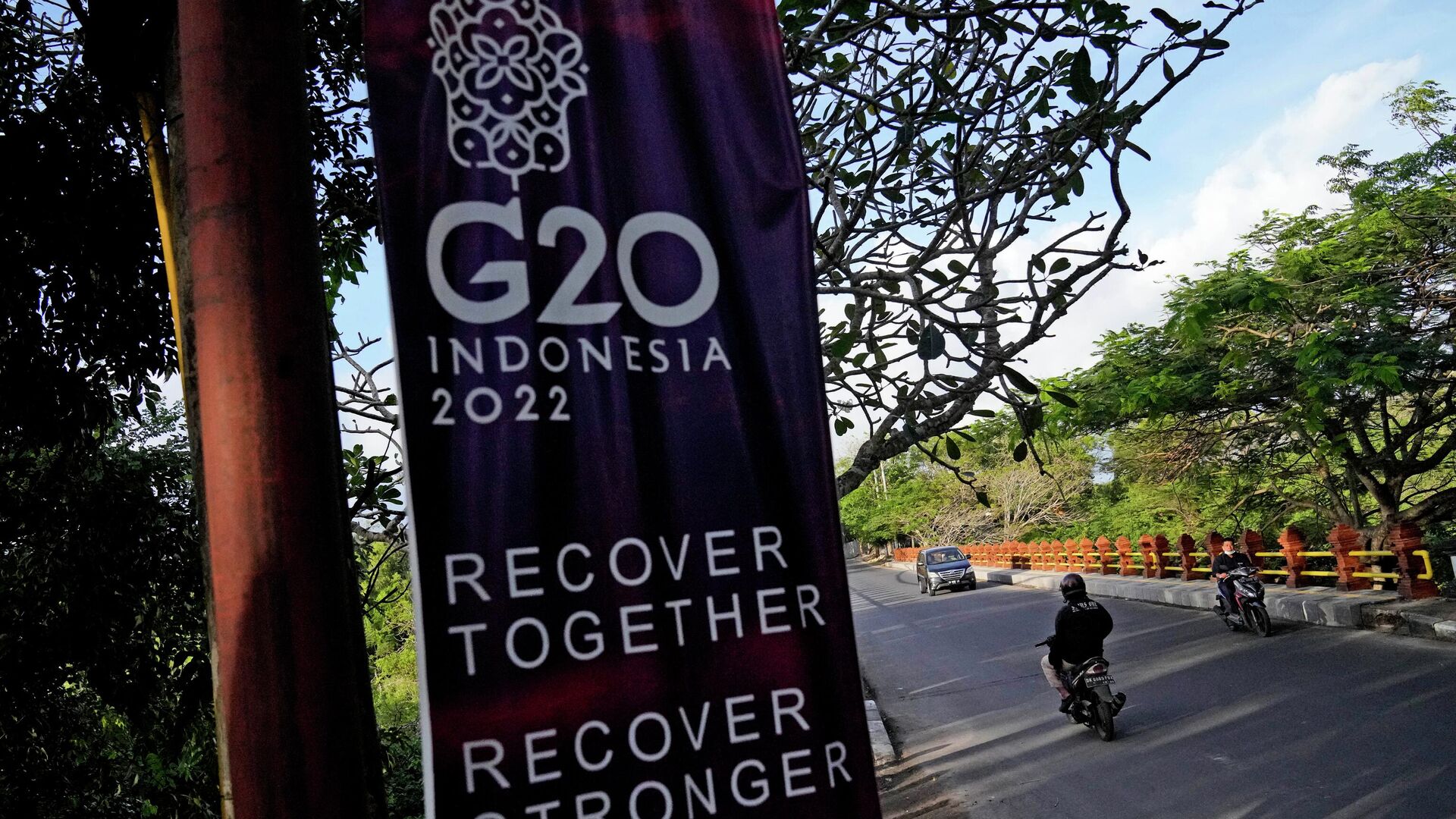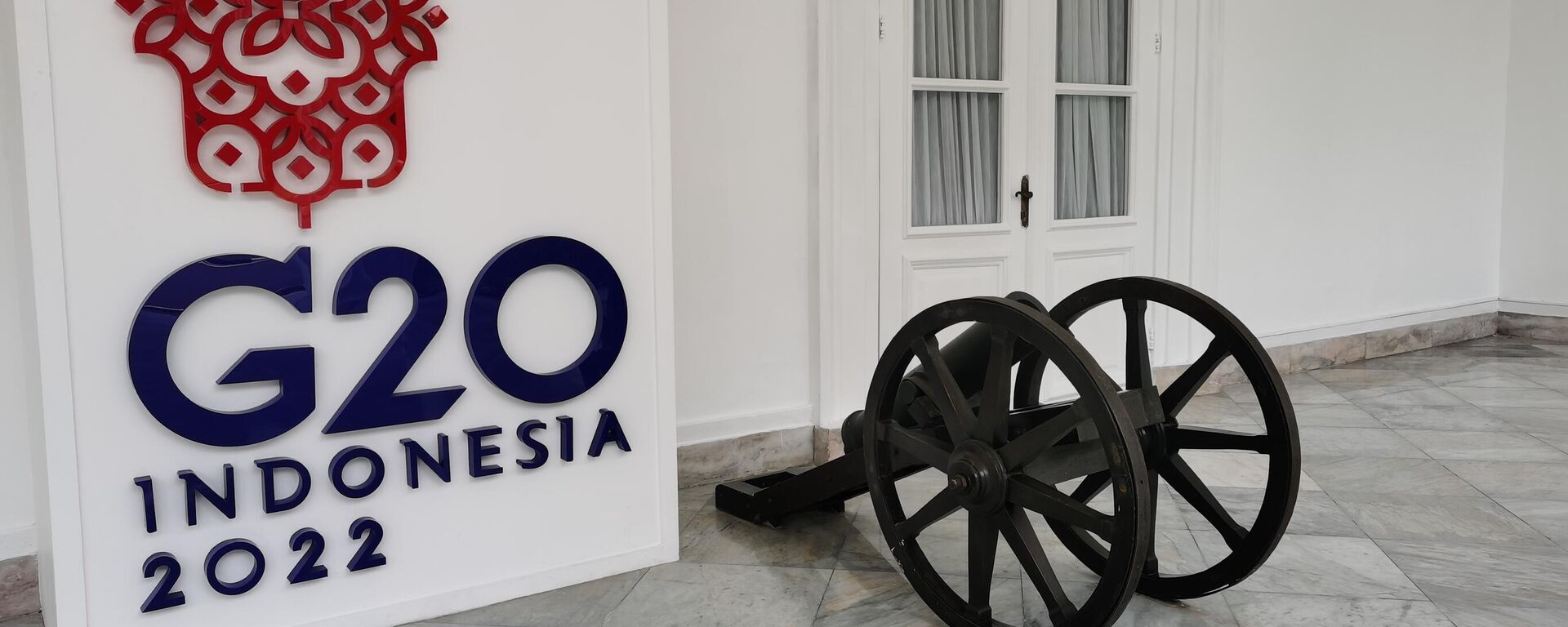https://sputnikglobe.com/20220707/russian-ambassador-indonesia-is-making-voices-of-developing-countries-heard-in-g20-1097059247.html
Russian Ambassador: Indonesia is Making Voices of Developing Countries Heard in G20
Russian Ambassador: Indonesia is Making Voices of Developing Countries Heard in G20
Sputnik International
As Indonesia is hosting the Group of Twenty Foreign Ministers’ Meeting on the island of Bali – one of the most important meetings ahead of the November... 07.07.2022, Sputnik International
2022-07-07T11:30+0000
2022-07-07T11:30+0000
2022-07-07T11:30+0000
interviews
indonesia
g20
russia
https://cdn1.img.sputnikglobe.com/img/07e6/07/07/1097063165_0:160:3073:1888_1920x0_80_0_0_f0549c549a705bc4931aa51d2dfb2d98.jpg
Russia is represented by a diplomatic delegation led by Foreign Minister Sergei Lavrov. According to Lyudmila Vorobieva, Russia’s ambassador to the Southeast Asian nation, so far Indonesia has been successful in creating a platform for inclusive dialogue within the G20.Sputnik: There have been calls from the West to ban Russia from the G20 because of Moscow’s special military operation in Ukraine, but Indonesian officials have underlined that Russia is still welcome to participate in the Group of Twenty meetings, which have been going on since the beginning of the year, and the summit scheduled for November. How important is the G20 for Indonesia, and what is the atmosphere like at the meetings?Lyudmila Vorobieva: Of course, the G20 presidency is important for Indonesia as it's raising the profile of Indonesia, which actually is one of the leading countries in the Muslim world, and a former APEC leader. And now Indonesia is chairing the G20. And it's very important that Indonesia is making the voice of developing countries heard in the G20, and in the world, and representing the interests of the developing countries. And from the very beginning, our country has supported the Indonesian G20 presidency and the priorities that have been identified by Indonesia, which are very relevant to the global economic and financial situation. We appreciate the position of the Indonesian government that it is a forum that should be inclusive and that should concentrate on the economic and financial agenda and not drag in political issues that are divisive. So far the Indonesian presidency has been successful. There have been a lot of meetings already in different areas and Russia has been participating actively in these meetings, and that's our intention so far.Sputnik: Moscow is very far away from Jakarta, but there are at least a few local NGOs that are friendly towards Russia. Some of them, such as the Gagarin Regiment and the Asian African Youth Government, openly express support for Russia’s special military operation in Ukraine. Why is that?Lyudmila Vorobieva: What we see here in Indonesia is that according to the polls, 80% of the population of Indonesia support Russia. There is a trend in the social media that people use “ura” (Russian war cry – Sputnik Ed.) to express their support for Russia. There are several reasons for that. First of all, of course, there are some anti-Western feelings, and anti-colonial feelings as well. The colonial past of Indonesia is still quite fresh in the memory of people and the atrocities committed by the Dutch colonizers are also quite fresh in the memories and in the hearts of Indonesian people. The second reason, I would say, is the personal popularity of our president here. President Putin is a leader that many Indonesians admire and would like to see him visiting Indonesia in the near future. And the third reason, I would say, is that Indonesians are aware that Russia has a big Muslim population, which are not immigrants - they are people who have been living in Russia for centuries, and they support the policy of President Putin. So, the combination of these reasons influenced the feelings of Indonesians towards Russia, and towards what we are doing in Ukraine.Sputnik: Indonesia is a nation that has chosen an independent approach to the issue of sanctioning Russia by refusing to follow orders from Western countries. What are the areas in which Moscow and Jakarta cooperate economically, and which projects might we see developing in the near future?Lyudmila Vorobieva: Last year, we saw more than 40% growth in trade turnover between Russia and Indonesia. And this year the trend is also very positive, with growth of more than 60%. Of course, it is not enough, we can do much more. But if the trend continues, we will reach five billion US dollars in trade turnover by the end of this year. This target was set by our presidents when they met in Sochi in 2016. We have joint investment projects. We can do much more, but that has been successfully going on. One of the projects is the construction of an oil refinery in Java, exploration and exploitation of oil and gas fields. There are success stories, such as an IT company that operates online service called Taxi Maxim in Indonesia, covering more than 60 cities in Indonesia. We are also discussing with our Indonesian partners more projects in energy, in shipbuilding, aircraft building, IT, pharmaceuticals, health care, and many others.Sputnik: At the end of June, when Indonesian leader Joko Widodo visited Moscow, Russian President Vladimir Putin said that there is a possibility of Indonesia developing relations with the Eurasian Economic Union – an economic bloc which consists of Russia, Uzbekistan, Belarus, Kazakhstan, Tajikistan, and several other nations which represent Europe and Asia. Are there any concrete details on how Jakarta reacted to this proposal?Lyudmila Vorobieva: Well, absolutely. It's a process that has already been going on. In 2018, the Indonesian government signed a Memorandum of Understanding with the Eurasian Commission on cooperation. We established a working group to explore the possibility of entering negotiations on a free trade agreement. The result was positive and we hope that by the end of the year we will start the negotiation process on establishing a free trade zone between the Eurasian Economic Union and Indonesia.
https://sputnikglobe.com/20220528/indonesian-ngo-head-backs-russias-g20-participation-president-putins-attendance-at-bali-summit-1095842086.html
indonesia
Sputnik International
feedback@sputniknews.com
+74956456601
MIA „Rosiya Segodnya“
2022
Denis Bolotsky
https://cdn1.img.sputnikglobe.com/img/07e5/06/0b/1083128270_0:0:961:960_100x100_80_0_0_8cd81dafcbaac1c176c25141f8af1d2a.jpg
Denis Bolotsky
https://cdn1.img.sputnikglobe.com/img/07e5/06/0b/1083128270_0:0:961:960_100x100_80_0_0_8cd81dafcbaac1c176c25141f8af1d2a.jpg
News
en_EN
Sputnik International
feedback@sputniknews.com
+74956456601
MIA „Rosiya Segodnya“
Sputnik International
feedback@sputniknews.com
+74956456601
MIA „Rosiya Segodnya“
Denis Bolotsky
https://cdn1.img.sputnikglobe.com/img/07e5/06/0b/1083128270_0:0:961:960_100x100_80_0_0_8cd81dafcbaac1c176c25141f8af1d2a.jpg
interviews, indonesia, g20
interviews, indonesia, g20
Russian Ambassador: Indonesia is Making Voices of Developing Countries Heard in G20
Exclusive
As Indonesia is hosting the Group of Twenty Foreign Ministers’ Meeting on the island of Bali – one of the most important meetings ahead of the November leaders’ summit, top diplomats from the forum’s member nations are discussing relations within the bloc and pressing issues, such as food security and multilateralism.
Russia is represented by a diplomatic delegation led by Foreign Minister Sergei Lavrov. According to Lyudmila Vorobieva, Russia’s ambassador to the Southeast Asian nation, so far Indonesia has been successful in creating a platform for inclusive dialogue within the G20.
Sputnik: There have been calls from the West to ban Russia from the G20 because of Moscow’s special military operation in Ukraine, but Indonesian officials have underlined that Russia is still welcome to participate in the Group of Twenty meetings, which have been going on since the beginning of the year, and the summit scheduled for November. How important is the G20 for Indonesia, and what is the atmosphere like at the meetings?
Lyudmila Vorobieva: Of course, the G20 presidency is important for Indonesia as it's raising the profile of Indonesia, which actually is one of the leading countries in the Muslim world, and a former APEC leader. And now Indonesia is
chairing the G20. And it's very important that Indonesia is making the voice of developing countries heard in the G20, and in the world, and representing the interests of the developing countries. And from the very beginning, our country has supported the Indonesian G20 presidency and the priorities that have been identified by Indonesia, which are very relevant to the global economic and financial situation. We appreciate the position of the Indonesian government that it is a forum that should be inclusive and that should concentrate on the economic and financial agenda and not drag in political issues that are divisive. So far the Indonesian presidency has been successful. There have been a lot of meetings already in different areas and Russia has been participating actively in these meetings, and that's our intention so far.
Sputnik: Moscow is very far away from Jakarta, but there are at least a few local NGOs that are friendly towards Russia. Some of them, such as the Gagarin Regiment and the Asian African Youth Government, openly express support for Russia’s special military operation in Ukraine. Why is that? Lyudmila Vorobieva: What we see here in Indonesia is that according to the polls, 80% of the population of Indonesia support Russia. There is a trend in the social media that people use “ura” (Russian war cry – Sputnik Ed.) to express their support for Russia. There are several reasons for that. First of all, of course, there are some anti-Western feelings, and anti-colonial feelings as well. The colonial past of Indonesia is still quite fresh in the memory of people and the atrocities committed by the Dutch colonizers are also quite fresh in the memories and in the hearts of Indonesian people. The second reason, I would say, is the personal popularity of our president here. President Putin is a leader that many Indonesians admire and would like to see him visiting Indonesia in the near future. And the third reason, I would say, is that Indonesians are aware that Russia has a big Muslim population, which are not immigrants - they are people who have been living in Russia for centuries, and they support the policy of President Putin. So, the combination of these reasons influenced the feelings of Indonesians towards Russia, and towards what we are doing in Ukraine.
Sputnik: Indonesia is a nation that has chosen an independent approach to the issue of sanctioning Russia by refusing to follow orders from Western countries. What are the areas in which Moscow and Jakarta cooperate economically, and which projects might we see developing in the near future?
Lyudmila Vorobieva: Last year, we saw more than 40% growth in trade turnover between Russia and Indonesia. And this year the trend is also very positive, with growth of more than 60%. Of course, it is not enough, we can do much more. But if the trend continues, we will reach five billion US dollars in trade turnover by the end of this year. This target was set by our presidents when they met in Sochi in 2016. We have joint investment projects. We can do much more, but that has been successfully going on. One of the projects is the construction of an oil refinery in Java, exploration and exploitation of oil and gas fields. There are success stories, such as an IT company that operates online service called Taxi Maxim in
Indonesia, covering more than 60 cities in Indonesia. We are also discussing with our Indonesian partners more projects in energy, in shipbuilding, aircraft building, IT, pharmaceuticals, health care, and many others.
Sputnik: At the end of June, when Indonesian leader Joko Widodo visited Moscow, Russian President Vladimir Putin said that there is a possibility of Indonesia developing relations with the Eurasian Economic Union – an economic bloc which consists of Russia, Uzbekistan, Belarus, Kazakhstan, Tajikistan, and several other nations which represent Europe and Asia. Are there any concrete details on how Jakarta reacted to this proposal? Lyudmila Vorobieva: Well, absolutely. It's a process that has already been going on. In 2018, the Indonesian government signed a Memorandum of Understanding with the Eurasian Commission on cooperation. We established a working group to explore the possibility of entering negotiations on a free trade agreement. The result was positive and we hope that by the end of the year we will start the negotiation process on establishing a free trade zone between the Eurasian Economic Union and Indonesia.






